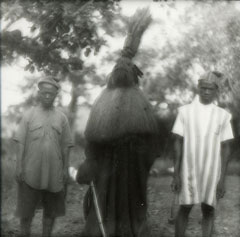Seminar: The Upper West African Forest Frontier - an ethnographic reassessment based on the work of Sjoerd Hofstra
 Some of the earliest ethnographic information on the peoples and institutions of the Upper West African forest came from Dutch cloth traders based at Cape Mount in the 17th century. The first major ethnographic study of the Mende people of this region, deploying the now standard technique of "deep immersion" pioneered by Malinowski, was provided by the Dutch anthropologist Sjoerd Hofstra. Hofstra never fully wrote down his study of the Mende community of Panguma based on 21 months of fieldwork in the mid 1930s. He did however take a few hundred photos and wrote extensive letters home, reporting on his fieldwork as it unfolded. These letters have recently come to light and have been edited and translated into English by Hofstra's daughter, a Dutch social historian. This seminar by Paul Richards of Njala University, Sierra Leone, is an evaluation of the significance of Hofstra's contribution to our understanding of longer-term social change on the war-affected frontier of Upper West African settlement.
Some of the earliest ethnographic information on the peoples and institutions of the Upper West African forest came from Dutch cloth traders based at Cape Mount in the 17th century. The first major ethnographic study of the Mende people of this region, deploying the now standard technique of "deep immersion" pioneered by Malinowski, was provided by the Dutch anthropologist Sjoerd Hofstra. Hofstra never fully wrote down his study of the Mende community of Panguma based on 21 months of fieldwork in the mid 1930s. He did however take a few hundred photos and wrote extensive letters home, reporting on his fieldwork as it unfolded. These letters have recently come to light and have been edited and translated into English by Hofstra's daughter, a Dutch social historian. This seminar by Paul Richards of Njala University, Sierra Leone, is an evaluation of the significance of Hofstra's contribution to our understanding of longer-term social change on the war-affected frontier of Upper West African settlement.
The occasion for this seminar is the recently published book "Among the Mende in Sierra Leone. Letters from Sjoerd Hofstra, 1934-36" (ASC Occasional publication vol. 19). Marijke Gijswijt-Hofstra, editor of the book and Hofstra's daughter, will give an introduction. Peter Pels, Department of Cultural Anthropology Leiden University, will be handed over the first copy of the book.
The ASC Library has valuable archival material from the estate of Sjoerd Hofstra. Read more about these archives in our latest Acquisition Highlight.
 More than 60 glass plate positives made by Sjoerd Hofstra in Sierra Leone in the 1930s have been digitalized by the ASC Library and published on Wikimedia Commons. The ASC Library is in the process of digitalizing a few hundred photographs also made by Hofstra, that will be added to Wikimedia Commons. (Photograph: Sjoerd Hofstra. Three people posing - Bondodancing ceremony. Sierra Leone, 1935. Panguma (surroundings). Collection Hofstra, glass plate positives. License: CC BY-SA 3.0)
More than 60 glass plate positives made by Sjoerd Hofstra in Sierra Leone in the 1930s have been digitalized by the ASC Library and published on Wikimedia Commons. The ASC Library is in the process of digitalizing a few hundred photographs also made by Hofstra, that will be added to Wikimedia Commons. (Photograph: Sjoerd Hofstra. Three people posing - Bondodancing ceremony. Sierra Leone, 1935. Panguma (surroundings). Collection Hofstra, glass plate positives. License: CC BY-SA 3.0)
Speaker
Paul Richards has worked on the societies and environments of the Upper West African forest region since the 1970s. He is currently Professor of Environmental Studies at Njala University, central Sierra Leone, where he directs a PhD program focusing on post-conflict rural social change. His major publications include Indigenous Agricultural Revolution (1985) and Fighting for the Rain Forest (1996).

